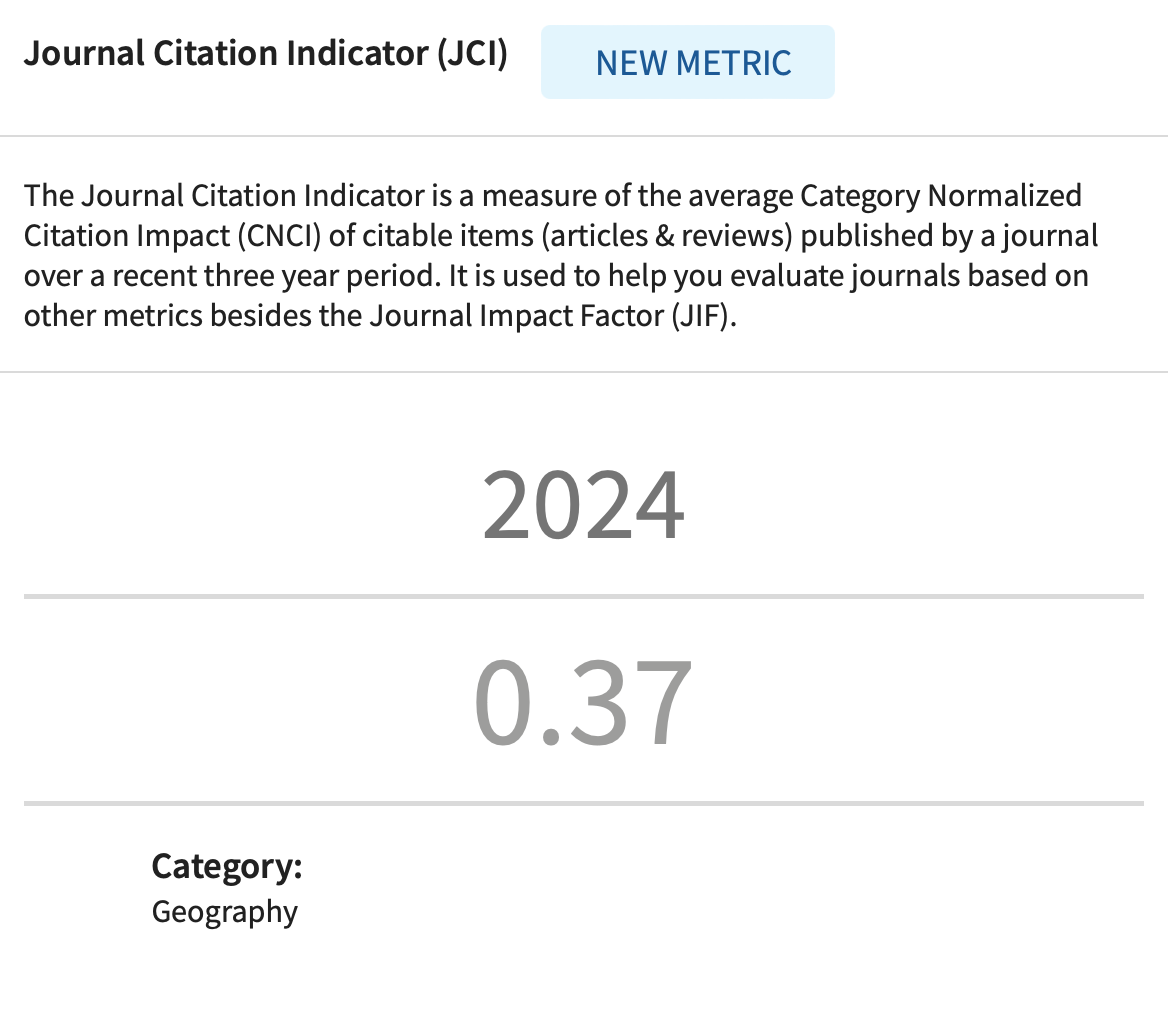ANALYSIS OF RURAL TRANSFORMATION TRAJECTORIES IN THE POST-SOVIET SOCIETY: A SPOTLIGHT ON DAGESTAN
DOI:
https://doi.org/10.2298/IJGI2403347IKeywords:
rural settlement, rural-urban systems, typology of rural areas, mountainous areas, North CaucasusAbstract
The article analyzes the spatial features of the post-Soviet socio-economic transformation of rural areas of southern Russia with the Republic of Dagestan as an example. The limited availability of reliable statistical data determined the need to organize five expeditions to Dagestan from 2020 to 2024. The results of the expeditions revealed a high spatial heterogeneity of rural development in the region. The presence of vast mountainous and the specifics of post-Soviet modernization of society and economy determine a particular nature of development of rural Dagestan. The classification procedure allowed identifying 10 types of districts in rural Dagestan with significant differences in their basic characteristics. The analysis of the dynamics of the main socio-economic indicators of Dagestan rural areas within different geographical, social, and economic types emphasized that a comprehensive analysis of the transformation of mountain territories should consider both the specific features of mountains and the factors of population and economy modernization. The study has shown that rural Dagestan has two main trajectories of socio-economic transformation of territories in the post-Soviet period, i.e., inertial and modernization. Together they demonstrate matching of such processes as the archaization and modernization of the local economy structure, and traditionalization and modernization of the society. It has been revealed that the inertial trajectory of rural transformation dominates in mountainous and piedmont rural areas, while the modernization one dominates in the plains. This is a serious challenge for the spatial development of the region.
Article metrics
References
Ataev, Z. V. (1997). Fiziko-geograficheskoe rajonirovanie Dagestana [Physical-geographical zoning of Dagestan]. DSPU.
Bendjeffal, B., & Benabdeli, K. (2015). Analysis of the Algerian experience of agricultural and rural development Journal of African Studies and Development, 7(7), 189–199. https://doi.org/10.5897/JASD2014.0316
Bobrovnikov, V. O. (2002). Musulmane Severnogo Kavkaza: Obychai, pravo, nasilie: ocherki po istorii i etnografii prava Nagornogo Dagestana [Muslims of the North Caucasus: Custom, Law, Violence; Essays on the History and Ethnography of Law of Mountainous Dagestan]. Vostochnaya literatura RAN.
Charlery de La Masselière, B., Bart, F., Racaud, S., Bonnassieux, A., & Baron, C. (2017). Mountains and Urbanization in East Africa. In S. Racaud, B. Nakileza, F. Bart, & B. Charlery de la Masselière (Eds.), Rural-Urban Dynamics in the East African Mountains (pp. 3–25). Mkuki na Nyota. https://univ-tlse2.hal.science/hal-01897520
Eldarov, E. M. (2008). Development of Daghestan’s Rural Population Settlement System in the Post-Soviet Period. The Caucasus and Globalization, 2(1), 105–115. https://ca-c.org.ru/c-g-rus-2006-2010.shtml
Federal State Statistics Service. (2024a). Regiony Rossii: Social'no-ekonomiceskie pokazateli [Regions of Russia: Socio-economic indicators [Data set]]. https://rosstat.gov.ru/folder/210/document/13204
Federal State Statistics Service. (2024b). Perepisi naselenija [Population censuses [Data set]]. https://rosstat.gov.ru/perepisi_naseleniya
Federal State Statistics Service. (2024c). Baza dannyh pokazatelej municipal'nyh obrazovanij Rossii [Database of indicators of municipal entities of Russia [Data set]]. https://rosstat.gov.ru/dbscripts/munst/
Gómez Valenzuela, V., & Holl, A. (2023). Growth and decline in rural Spain: an exploratory analysis. European Planning Studies, 32(2), 430–453. https://doi.org/10.1080/09654313.2023.2179390
Guo, Y., Zhai, S., Huang, J., & Guo, H. (2024). Characteristics of the Spatial Structure of Traditional Villages in the Xinjiang Uygur Autonomous Region in China and Their Influence Mechanisms. Buildings, 14(11), Article 3420. https://doi.org/10.3390/buildings14113420
Herbers, H. (2001). Transformation in the Tajik Pamirs: Gornyi-Badakhshan–an example of successful restructuring? Central Asian Survey, 20(3), 367–381. https://doi.org/10.1080/02634930120095367
Hussain, M. (2015). Rural Development in Kashmir. JAYKAY Publications.
Karpov, Yu. Yu., & Kapustina, E. L. (2011). Highlanders after the mountains. Migration processes in Dagestan in the XX – early XXI centuries: their social and cultural consequences and prospects Highlanders after the Mountains. Petersburg Oriental Studies.
Kelfaoui, A., Rezzaz, M., & Kherrour, L. (2021). Revitalization of Mountain Rural Tourism as a Tool for Sustainable Local Development in Kabylie (Algeria). The Case of Yakouren Municipality. Geojournal of Tourism and Geosites, 34(1), 112–125. https://doi.org/10.30892/gtg.34115-626
Kisriev, E. F. (2004). Islam i vlast'v Dagestane [Islam and State Power in Dagestan]. OGI.
Knežić, G., Blagojević, Z., & Drinić, L. (2021). Typology of Rural Areas on the Territory of Mrkonjic Grad Municipality. Agriculture and Forestry, 67(2), 227–238. http://doi.org/10.17707/AgricultForest.67.2.16
Kopainsky, B., & Rieder, P. (2004). Processes and determinants of rural development in Switzerland. In B. Lehmann & P. Rieder (Eds.), 22nd International System Dynamics Conference (pp. 1–21). Albany. https://clck.ru/3EvdHX
Mann, S. (2009). Institutional causes of urban and rural sprawl in Switzerland. Land Use Policy, 26(4), 919–924. https://doi.org/10.1016/j.landusepol.2008.11.004
Messerli, B., Viviroli, D., & Weingartner, R. (2004). Mountains of the World: Vulnerable Water Towers for the 21st Century. Ambio: A Journal of the Human Environment, 13, 29–34. https://doi.org/10.5167/uzh-110516
Milkov, F. N., & Gvozdetsky, N. A. (1976). Fizičeskaja geografija SSSR: obsij obzor. Evropejskaja častʹ SSSR. Kavkaz [Physical geography of the USSR. General review of the European part of the USSR. Caucasus]. Visshaia Shkola.
Mkrtchyan, N. V. (2019). Migracia na Severnom Kavkaze skvoz prizmu nesoveršennoj statistiki [Migration in the North Caucasus through the Prism of Imperfect Statistics]. The Journal of Social Policy Studies, 17(1), 7–22. https://doi.org/10.17323/727-0634-2019-17-1-7-22
Muduev, S. Š. (2003). Geografičeskie osobennosti transformacii rasselenija i hozjajstva Dagestana v 1990-e gg [Transformation of settlement and economy in Dagestan in the 1990s, Doctoral dissertation, Russian Academy of Sciences, Institute of Geography]. https://search.rsl.ru/ru/record/01002636857
Nefedova, T. G. (2013). Desyat’ aktual’nykh voprosov o sel’skoi Rossii: otvety geografa [Ten topical issues about rural Russia: A geographer’s viewpoint]. Lenand.
Okahashi, H. (2016). The Transformation of a Himalayan Mountain Village under the Rapid Economic Growth in India: A Case Study of the State of Uttarakhand. Journal of Urban and Regional Studies on Contemporary India, 2(2), 11–24. https://core.ac.uk/download/pdf/222957976.pdf
Osmanov, A. I. (2000). Agrarnye preobrazovaniya v Dagestane i pereselenie gorcev na ravninu (20-70-e gody XX v.) [Agrarian transformations in Dagestan and the migration of highlanders to the plain (1920s–1970s)]. IIAE DSC RAS.
Polyan, P. M., & Sergeeva, K. P. (1986). Tendenciya razvitiya sel'skoj mestnosti gornogo Dagestana [Trends in the development of rural areas of mountainous Dagestan]. In V. A. Maximov (Ed.), Selʹskaja mestnostʹ: territorialʹnye aspekty socialʹno-ekonomičeskogo razvitija [Rural areas: territorial aspects of socio-economic development] (pp. 89–100). Baškirskij gosudarstvennyj universitet.
Pomázi, I., & Szabó, E. (2010). Main socio-economic and environmental trends in the Carpathian region. Hungarian Geographical Bulletin, 59(2), 147–165. https://ojs.mtak.hu/index.php/hungeobull/article/view/3090
Schirpke, U. (2023). Ecosystem Services and Benefits of Nature to People: Global Change Pressures and Conflicts of Use in Mountainscapes. In F. O. Sarmiento (Ed.), Montology Palimpsest: A Primer of Mountain Geographies (Vol. 1, pp. 443–470). Springer. https://doi.org/10.1007/978-3-031-13298-8_25
Sergeeva, K. P. (1967). Problemy selʹskogo vysotnogo rasselenija v Dagestanskoj ASSR [Problems of rural high-altitude settlement in the Dagestan ASSR, Doctoral dissertation, Leningrad State Pedagogical Institute named after A. I. Herzen]. https://search.rsl.ru/ru/record/01008404021
Shahi, D. K. (2022). Morphological and Functional Change of Rural Settlements in the High Himalayan Region A Case Study of Arakot, Uttarkashi. Research Journal of Humanities and Social Sciences, 13(1), Article 45-0. https://doi.org/10.52711/2321-5828.2022.00008
Shehu, D., Osmani, E., Collaku, N., & Shehu, A. (2013). Challenges of sustainable development in rural areas of Albania. Journal of Food, Agriculture and Environment, 11(2), 1349–1352. https://doi.org/10.1234/4.2013.4557
Starodubrovskaya, I. V., Zubarevich, N. V., Sokolov, D. V., Intigrinova, T. P., Mironova, N. I., & Magomedov, K. G. (2011). Severniy Kaukaz: modernizatsionniy vyzov [North Caucasus: modernization challenge]. Delo.
Taleshi, M. (2007). Rural development in small mountainous settlements: case study of Bojnord region, north-eastern part of Iran. In E. Tiezzi, J. C. Marques, C. A. Brebbia, & S. E. Jorgensen (Eds.), Ecosystems and Sustainable Development (Vol. 106, pp. 313–319). WIT Press. https://doi.org/10.2495/ECO070301
Thorbeck, D., Isalou, A., & Bayat, M. (2014). Rural Growth and Decay: Analysis of Physical-Spatial Transformation of Rural Area in Iran (Case Study: Kahak Area of Qom Province). International Journal of Architecture and Urban Development, 4(1), 25–32. https://clck.ru/3EzRB3
Türker, M. F., Öztürk, A., Durusoy, I., & Pak, M. (2003, September 21–28). Socio-economic, cultural and demographic structures of Turkish forest villages and development approaches. XII World Forestry Congress. Quebec City, Canada. https://www.fao.org/4/XII/0412-A2.htm
Vendina, O. I. (2016). Dagestan: tradicija kak uslovie modernizacii [Dagestan: tradition as a chance for modernization]. Science, Innovations, Technologies, 3, 137–164. https://scienceit.elpub.ru/jour/index
Downloads
Published
How to Cite
Issue
Section
License
Copyright (c) 2024 Journal of the Geographical Institute “Jovan Cvijić” SASA

This work is licensed under a Creative Commons Attribution 4.0 International License.











